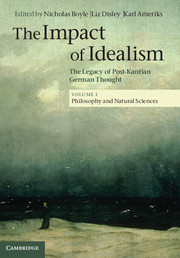Book contents
- Frontmatter
- Contents
- List of Illustrations
- List of Contributors
- Acknowledgements
- List of Abbreviations
- Foreword
- General introduction: the eighteenth and nineteenth centuries
- General introduction: the twentieth and twenty-first centuries
- Introduction: Idealism in the natural sciences and philosophy
- 1 Philosophy of natural science in Idealism and neo-Kantianism
- 2 The impact of German Idealism and Romanticism on biology in the nineteenth century
- 3 The unconscious: transcendental origins, Idealist metaphysics and psychoanalytic metapsychology
- 4 Nietzsche, Kant and teleology
- 5 Transcendental idealism, phenomenology and the metaphysics of intentionality
- 6 Heidegger and the impact of idealism
- 7 French Hegelianism and anti-Hegelianism in the 1960s: Hyppolite, Foucault and Deleuze
- 8 Scottish Idealism
- 9 ‘My station and its duties’: social-role accounts of obligation in Green and Bradley
- 10 Idealism and the origins of analytic philosophy1
- 11 Idealism and Pragmatism: the inheritance of Hegel's concept of experience
- 12 Reason's form
- Bibliography
- Index
- References
1 - Philosophy of natural science in Idealism and neo-Kantianism
Published online by Cambridge University Press: 05 December 2013
- Frontmatter
- Contents
- List of Illustrations
- List of Contributors
- Acknowledgements
- List of Abbreviations
- Foreword
- General introduction: the eighteenth and nineteenth centuries
- General introduction: the twentieth and twenty-first centuries
- Introduction: Idealism in the natural sciences and philosophy
- 1 Philosophy of natural science in Idealism and neo-Kantianism
- 2 The impact of German Idealism and Romanticism on biology in the nineteenth century
- 3 The unconscious: transcendental origins, Idealist metaphysics and psychoanalytic metapsychology
- 4 Nietzsche, Kant and teleology
- 5 Transcendental idealism, phenomenology and the metaphysics of intentionality
- 6 Heidegger and the impact of idealism
- 7 French Hegelianism and anti-Hegelianism in the 1960s: Hyppolite, Foucault and Deleuze
- 8 Scottish Idealism
- 9 ‘My station and its duties’: social-role accounts of obligation in Green and Bradley
- 10 Idealism and the origins of analytic philosophy1
- 11 Idealism and Pragmatism: the inheritance of Hegel's concept of experience
- 12 Reason's form
- Bibliography
- Index
- References
Summary
The project of transcendental philosophy, as originally conceived by Kant, essentially involved an explanation of how purely intellectual concepts can necessarily apply to our (human) sense experience of the natural world. Kant's project also involved an explanation of how pure mathematical concepts can necessarily apply to this same experience, where such an explanation is conceived in a distinctive way. The pure intellect, for Kant, is modelled on the Leibnizian conception of logic, whereas the faculty of pure sensibility is modelled on the Newtonian conception of space and time. Mathematics then necessarily applies to our sense experience in so far as the pure forms of our sensibility – space and time – are themselves the primary sources of pure mathematical knowledge. However, this does not yet show that all natural objects presented to us within these forms of sensibility are also necessarily subject to both pure mathematics and the pure concepts of the understanding; and it is precisely this, for Kant, which is shown in the Transcendental Deduction by demonstrating that there is a necessary harmony or interdependence between the pure intellect, on the one side, and both pure and empirical intuition, on the other. It is only this necessary harmony between two initially independent faculties that fully explains how synthetic a priori knowledge is possible, for Kant, and, in particular, how mathematical natural science (Newtonian physics) is possible.
Yet a rejection of Kant's sharp separation of the faculties of the mind into understanding and sensibility is characteristic of post-Kantian German idealism – as well as of the Marburg School of neo-Kantianism founded by Hermann Cohen and developed, especially, by Ernst Cassirer. This was part and parcel, as is well known, of a more general effort to overcome all of Kant's most fundamental dichotomies or ‘dualisms’, including the notorious dichotomy between phenomena and noumena. How this effort is implicated in the ongoing attempts to revise Kant's philosophy of natural science in the light of the revolutionary new developments in the sciences themselves throughout the nineteenth and the early twentieth centuries is the main topic of this essay.
- Type
- Chapter
- Information
- The Impact of IdealismThe Legacy of Post-Kantian German Thought, pp. 72 - 104Publisher: Cambridge University PressPrint publication year: 2013
References
- 7
- Cited by

